DCRI faculty and staff took part in more than 80 events at the 2023 American College of Cardiology Scientific Sessions (ACC.23), paired together with the World Congress of Cardiology (WCC).
Events included late-breaking and featured presentations, panel discussions, debates, mentorship events, and moderated poster sessions. They covered topics ranging from interventional therapies, and drug comparisons, to guideline adherence and preventive care.
DAY 1 HIGHLIGHTS
ACC.23 kicked off Saturday, March 4, in New Orleans. The day’s late-breaking trials and science included an evaluation of bempedoic acid as an alternative for statin-intolerant patients and the first randomized controlled trial of transcatheter edge-to-edge repair of the tricuspid valve for severe, symptomatic tricuspid regurgitation.
Coverage of Duke/DCRI faculty and staff sessions:
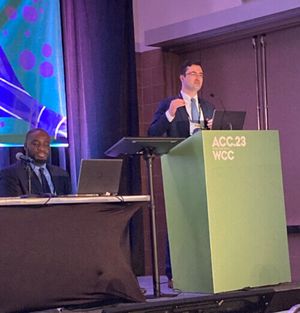
Session Title: The Six Million Dollar Bionic Patient: Novel Devices in Stage C Heart Failure
Presentation Title: Punch to the Guts--Splanchnic Nerve Blockade as a Heart Failure Therapy?
Presenter: Marat Fudim, MD, Assistant Professor, Cardiology, Advanced Heart Failure, Transplant | Duke University, Duke Clinical Research Institute
Description: Device therapy in heart failure has revolutionized the treatment of this disease across the spectrum of stages of heart failure.
Presentation Quotes: “The preliminary open-label results from the multicenter REBALANCE-HF roll-in cohort support the safety and efficacy of SAVM in HFpEF. The findings require confirmation in the ongoing randomized, sham-controlled portion of the trial.” — Marat Fudim, MD
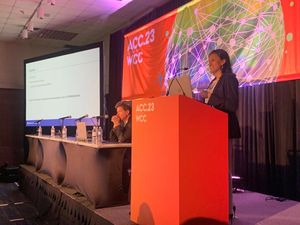
Session Title: Why is No One Following the Guidelines?! The Need for Implementation Science
Presentation Title: Implementation Science in Cardiometabolic Disease — The Rise of the Cardiometabolic Prevention Clinic
Presenter: Neha Pagidipati, MD, MPH, Assistant Professor of Medicine, Cardiovascular Disease Prevention Specialist | Duke University, Duke Clinical Research Institute
Description: Despite numerous proven therapies to lower cardiovascular disease risk, risk factor control in both primary and secondary prevention remains suboptimal. Adoption of new therapies into clinical practice is slow, limiting the ultimate impact of scientific innovation and discovery. This session highlighted strategies to close the gap between evidence and practice in cardiovascular prevention across populations and disease states.
Presentation Quotes:
“This is the single most important thing we could be talking about at this meeting.”
“There is a massive need for improved preventive care in patients with cardiometabolic disease.
Coordination is the theme in every single thing that people are doing around the country — they’re
breaking down silos and bringing clinicians together for the benefit of these patients.” — Neha Pagidipati, MD, MPH
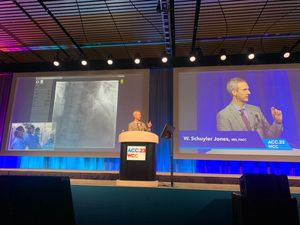
Session Title: Interventional Live Cases II: Coronary Cases from University of Illinois Chicago and Medical University of South Carolina
Moderator and Co-Chair: Schuyler Jones, MD, Associate Professor of Medicine, Interventional Cardiology | Duke University, Duke Clinical Research Institute
DAY 2 HIGHLIGHTS
Session Title: Ageing and Athleticism: Cardiovascular Care of the Masters Athlete
Presentation Title: Debate: To Stent or Not to Stent.. A Masters Athlete with Obstructive CAD (CON)
Presenter: Manesh Patel, MD, Chief, Division of Cardiology Co-Director Duke Heart Center|Duke University, Duke Clinical Research Institute
Description: Individuals participating in intense exercise and recreational sport as Masters continues
to increase internationally. With that, inherent and unique cardiovascular risks and concerns require
special attention. In addition, controversies have arisen regarding best clinical practices that may
contrast with what is accepted in the general population.
Presentation Quote: “Master athlete or not, I believe we need to do a much better job of identifying and studying the ways to study/screen atherosclerosis in middle-age adults” — Manesh Patel, MD
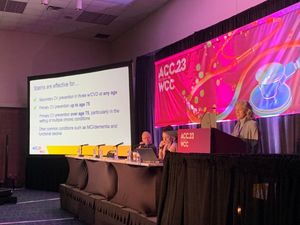
Session Title: Controversies and Challenges in Lipid Management
Presentation Title: Am I Too Old For a Statin? No.
Presenter: Karen Alexander, MD, Professor of Medicine, Cardiovascular disease management and outcomes in special populations | Duke University, Duke Clinical Research Institute
Presentation Quotes: "Are you too old for a statin over age 75 for primary prevention? We’re actually doing the study, PREVENTABLE, to find out the answer to this question. We've already enrolled 5,300 older adults in the US, which is pretty awesome, and we need to enroll 15,000 more.
“Am I too old for a statin? For secondary prevention, you’re never too old. Primary prevention over age 75 — it’s probably about risk and competing risk as much as age, per se. Certainly the consideration of cath, risk, de-risk, competing risk and the issues of polypharmacy need to be considered. And, if you don’t have the right answer, put someone in a trial. We have that trial, and hopefully we’ll have that answer in 2027.” — Karen Alexander, MD
Session Title: What Do I Tell My Patient to Eat?
Presentation Title: Putting It All Together: What I Tell My High-Risk Patients to Eat
Description: A healthy diet remains a cornerstone of cardiovascular disease prevention. However, evolving paradigms, conflicting evidence, and limited training can make it hard for clinicians to effectively counsel their patients. This session leveraged field expertise to deliver practical evidence-based tips for clinicians.
Presenter: Neha Pagidipati, MD, MPH, Assistant Professor of Medicine, Cardiology, Cardiovascular Disease Prevention Specialist | Duke University, Duke Clinical Research Institute
Presentation Quote: “The thing that I emphasize for my patients are: We're going for long-term, sustainable lifestyle change. This is not a fad diet that we're going for. Those things you cannot sustain for a life. And, I'm not trying to help you lose weight, I'm trying to help you live the heart-healthiest life you can live for the longest period of time, which means we need to be able to sustain what you do for the next many decades.” — Neha Pagidipati, MD, MPH
DAY 3 HIGHLIGHTS
Session Title: Joint American College of Cardiology/Journal of the American Medical Association Late-Breaking Clinical Trials
Presentation Title: Coordinating Cardiology Clinics Randomized Trial of Interventions To Improve Outcomes (COORDINATE) – Diabetes: Primary Results
Presenter: Neha Pagidipati, MD, MPH, Assistant Professor of Medicine, Cardiology, Cardiovascular Disease Prevention Specialist | Duke University, Duke Clinical Research Institute
Read More about the COORDINATE-Diabetes trial and results
Session Title: CV Prevention in Diabetes: Finding the Sweet Spot
Presentation Title: Emerging Therapies for Diabetes in High-Risk CV Patients
Description: With an increasing number of therapies available to lower CV risk in patients with diabetes, the possibilities can become overwhelming for clinicians and patients alike. This session aimed to address major questions in the field that arise during clinical care.
Presenter: Jennifer Green, MD, Professor of Medicine | Duke University, Duke Clinical Research Institute
Presentation Quote: “We’ve got clear indications for the use of SGLT2 inhibitors and GLP1 receptor agonists in high-risk patient populations with type 2 diabetes, so we need to use them. We need to think about, in addition to starting single agents of use of particular combinations in high-risk patients, to also consider proactive and early use of these drugs with an outcomes benefit.” — Jennifer Green, MD
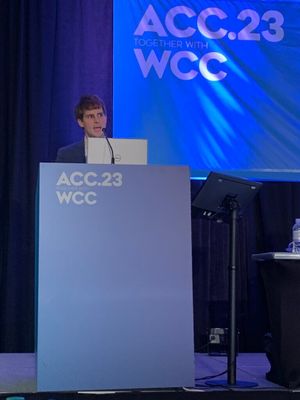
Session Title: The Systemic Syndrome of Heart Failure: A Closer Look at Non-Cardiovascular Comorbidities
Presentation Title: Quad Therapy vs. Avoiding Polypharmacy: Titration of GDMT in Elderly Patients with HF and Comorbidities
Description: Patients with heart failure can be exceptionally complex with a large burden of coexisting comorbidities that include obesity, diabetes mellitus, chronic kidney disease, anemia, cognitive impairment, frailty, sleep disordered breathing, etc. These comorbidities have been associated with worse clinical outcomes. A better understanding of personalized therapeutic management of comorbdities in those with heart failure is essential in this vulnerable population.
Presenter: Stephen Greene, MD, Assistant Professor of Medicine | Duke University, Duke Clinical Research Institute
Presentation Quote: “When you're talking to patients and reviewing their medications, ask yourself some key questions — this has also been very helpful for me when I'm seeing patients in my clinic:
- How many of the medications on that list have been tested in multiple large scale randomized controlled trials?
- How many of those medications have been proved to reduce all cause mortality?
- How many of the medications have been proven to make patients feel better?
- And how many of the medications have been proven to be safe?
“While shared decision making is always critical with patients, if you inform them of the evidence-based benefits that we're talking about, GDMT usually rises to the top in terms of priorities, value and importance. Likewise, we need to consider de-prescribing medications that are less valuable and important to the well-informed patient.” — Stephen Greene, MD
Download the Full List of ACC.23 DCRI Events
DCRI in the News from ACC.23
DCRI faculty members featured in news media from ACC.23:
- Lower use of guideline-recommended HF therapies at rural vs. urban hospitals, Healio, Stephen Greene
- Top takeaways from NUDGE FLU at ACC 2023, NCP Live, Stephen Greene
- COORDINATEd effort boosts optimal therapy in patients with T2D and ASCVD, MDedge, Neha Pagidipati
- Atorvastatin tied to cardioprotection for lymphoma patients on anthracyclines, Medpage Today, Manesh Patel
- HALO: Baxdrostat no better than placebo in uncontrolled hypertension, TCT MD, Manesh Patel
- Imaging data may predict best responders to evolocumab therapy: YELLOW III, Healio, Manesh Patel
- The Triple Whammy: Obesity, diabetes and sleep-disordered breathing and their impact on CVD, Journal of the American College of Cardiology, Nishant Shah